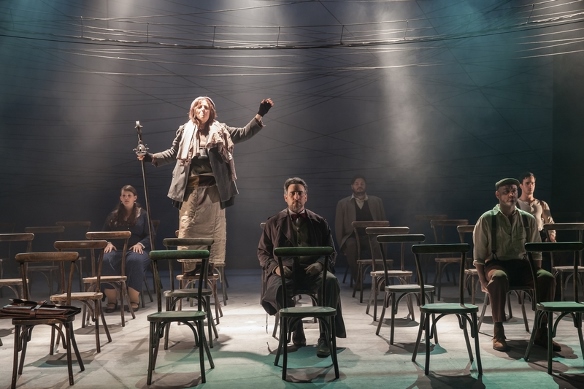
The elusive quality of happiness is conveyed with heartbreaking beauty in the Beer Sheva Theatre production of You Don’t Fight a Duel Nowadays. Written by Shahar Pinkas, and directed by Shir Goldberg, the play is based on short stories by Vladimir Nabokov, recounting the lives of immigrants and local Germans in the harsher neighborhoods of Berlin, where the skies are always gray. Powerful and moving, the play captures the essence of Nabokov in its ability to wrestle exquisite imagery and enchanted moments out of the most wretched human weakness and misery.
Opening with a very stylized scene, wires and cables slice across the sky, a ragged woman (Michal Weinberg) sings and tells of these Berlin streets, and then others come on carrying old-fashioned wooden chairs, in movement choreographed by Ariel Wolf. More and more chairs are set on the stage, there is something pressured and anonymous about the movement, yet somewhere in it all, three of the people stand – if only for an instant – on the chairs, illuminated by the light, looking up towards some brighter vista. A child’s kite is caught in the wires, his mother tries to set it free, but it is held fast. It sets the scene for the desires, thwarted desires, hardship, violence, and grief that will play out on the stage. These stories of Nabokov* were written around the 1930s, and the costumes by Judith Aharon reflect this in a subtle manner, and harmonious muted palette of grays, brown, beige, and cream, with a touch of blue.
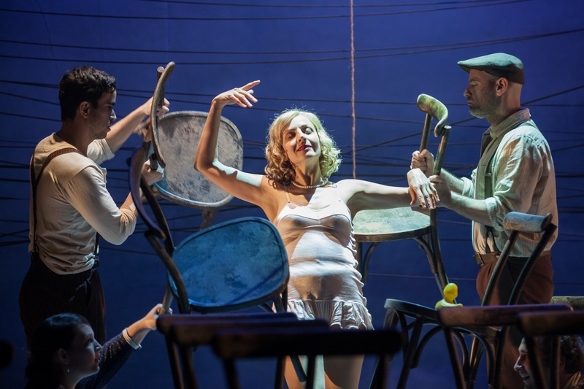
Three interlocking stories play out and one comes to know the characters as the stories develop. The hapless Anton Petrovich (Muli Shulman) and his beautiful wife Ilka (Michal Weinberg) who thinks Anton’s colleague Berg (Zohar Strauss) resembles an Englishman; Gustav (Eliran Harush) who bullies and schemes his way through life, and his fiancée Anna (Zohar Meidan) who dreams of learning French; Pilgram (David Kigler) who likes butterflies (a well-known Nabokov passion), his wife Eleonora (Ada Edni) who struggles to survive the circumstances of her life, and their son Karl (Yam Avni); the mysterious Romantovksi (Ron Bitterman) with the rough exterior, dark past, and tender care for his cognitively impaired brother Tomek (Ala Dakka).
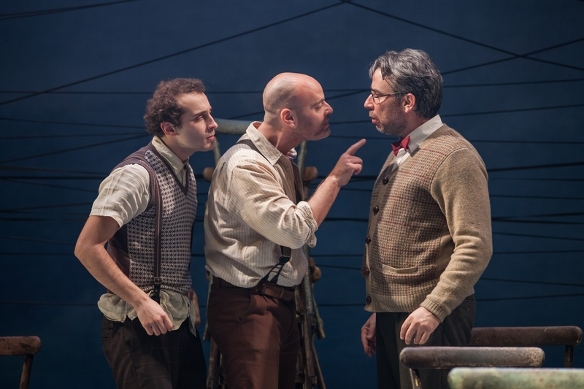
The play is very freely adapted from the short stories, coming together as a whole, suspenseful, moving, and very intense. Happily, there are many comic moments and clever dialogue along the way. The ensemble cast is excellent, with performances that successfully convey the ambiguities of feeling, even the brash Berg has his fleeting moment of tenderness. Ala Dakka rises to the challenge in his portrayal of the impaired Tomek, whose grasp of events is fragmented, and in his repetition of words and phrases, his innocent questioning often touches on the most acute places, as when on the train with Anton and Romantovski, he says that the rattling of the train on the tracks sounds as if a voice is saying: “to the slaughter.” It’s a role that could have been played broadly, for laughs, and Dakka’s restraint takes it deeper.
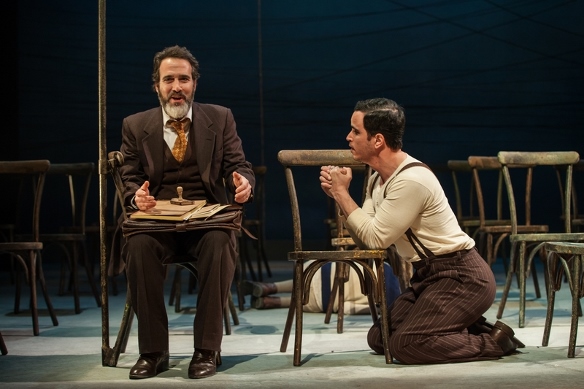
Ada Edni’s character Leonora has perhaps the longest road to travel, and she takes audience with her all the way, through the confusion, loss, determination, ephemeral smiles, and eternal struggle, all the way to the shattering finale. They say that children steal the show, yet in this case, ten-year-old Yam Avni truly stood out as Karl, Pilgram and Leonora’s son. A challenging role that incorporates the innocence of childhood, the acting out of a hurt and confused boy, and the inventive resourcefulness of a hopeful spirit – Avni made it all happen – Bravo!
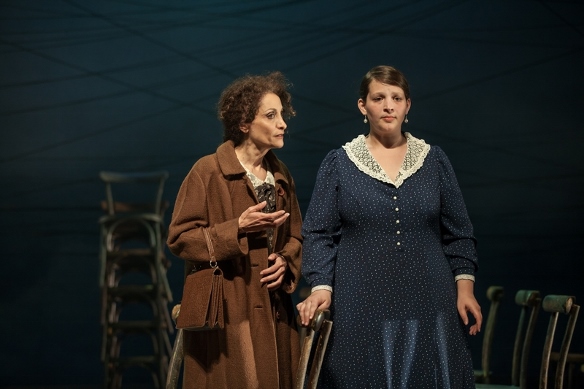
The fragility of human existence, the weakness and strength of the human spirit and imagination, are expressed in all the elements of the play – text, direction, music, movement, costumes, and design – to create a compelling work with eloquent emotional impact.
*To the best of my tracking ability, the play is based on Vladimir Nabokov’s stories: The Aurelian, An Affair of Honor, and The Leonardo.
You Don’t Fight a Duel Nowadays
A play by Shahar Pinkas based on Nabokov’s A Russian Dozen; Director: Shir Goldberg; Set design: Adam Keller; Light design: Ziv Voloshin; Costume design: Judith Aharon; Music: Nadav Vikinski; Choreography: Ariel Wolf; Cast: Ron Bitterman – Romatovski, Ala Dakka/Nitzan Rotshcild – Tomek, Eliran Harush – Gustav, Michal Weinberg – Ilka/Petrovich, Zohar Meidan – Anna, Adva Edni – Eleonora, David Kigler – Pilgram, Muli Shulman – Anton Petrovich, Zohar Strauss – Mr. Berg, Yam Avni/Michael Frank – Karl.





